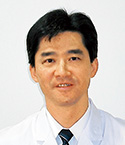Gastroenterology
Overview of the department

Chairman
Prof. Nakamoto Yasunari
Consultation system/therapeutic strategies
Outpatient medical care is conducted by specialists in gastroenterology/instructors, specialists in gastrointestinal endoscopy/instructors, and specialists in hepatology/instructors.
For admission care, a team consisting of an instructor, attending physician, and residents is responsible. Therapeutic strategies are selected at conferences on Monday/Friday every week.
Field of expertise
1) Endoscopic treatment for esophageal/gastric/colorectal cancers (ESD)
2) Endoscopic sclerotherapy for esophageal/gastric varices/ligation (EIS/EVL)
3) Diagnosis and treatment of Helicobacter pylori infection
4) Radiofrequency ablation for primary liver cancer (RFA/PEIT)
5) Combination therapy with IFN and anticancer drugs for primary liver cancer
6) Endoscopic treatment for biliary/pancreatic calculi
7) Endoscopic stenting for malignant stenosis of the bile duct
8) Endoscopic ultrasonography-guided fine needle aspiration (EUS-FNA)
9) Diagnosis/treatment by balloon assisted enteroscopy
10) Capsule endoscopy of the small/large intestines
Advanced medical practice
Endoscopic submucosal dissection (ESD)
As endoscopic treatment for early digestive cancers, ESD has been introduced. Favorable results have been obtained. In the future, this procedure will be positively performed to treat esophageal, gastric, and colorectal cancers.
Balloon assisted enteroscopy/capsule endoscopy
Small intestinal disorders are diagnosed/treated using double-/single-balloon enteroscopy/capsule endoscopy.
EUS-FNA
Using an EUS-FNA system, submucosal gastrointestinal tumor/extra-gastrointestinal lymph node/pancreatic tumor biopsies are performed at all times.
Advanced medical practice
1) CYP2C19 gene polymorphism-based tailor-made Helicobacter pylori eradication therapy
2) Prediction/evaluation of the therapeutic effects of interferon by IL28B genetic diagnosis
Symptoms/diseases treated in our department
Hematemesis, melena, and obstructive jaundice are managed as emergencies based on a 24-hour system. We are responsible for the treatment of all diseases of the digestive tract/solid digestive organs, including reflux esophagitis, esophageal cancer, esophageal varices, gastritis, gastric ulcer, gastric cancer, duodenal ulcer, enteritis, colorectal polyp, colorectal cancer, ulcerative colitis, Crohn’s disease, pancreatic calculi, pancreatitis, pancreatic cancer, gallstones, cholecystitis, gallbladder cancer, biliary calculi, cholangitis, cholangiocarcinoma, hepatitis, liver cirrhosis, liver cancer, and metastatic liver cancer.
Primary examinations and explanations
Outpatient clinic
Esophagogastroduodenoscopy: Esophagus, stomach, and duodenum
Colonoscopy: Large intestine
Endoscopic ultrasonography: Esophagus, stomach, large intestine, pancreas, and gallbladder
Abdominal ultrasonography: Liver, gallbladder, pancreas, kidney, and spleen
Admission
ERCP: Gallbladder, bile duct, and pancreas Liver biopsy: Liver
 University of Fukui Hospital
University of Fukui Hospital University of Fukui Hospital
University of Fukui Hospital +81-776-61-311
+81-776-61-311 Access
Access